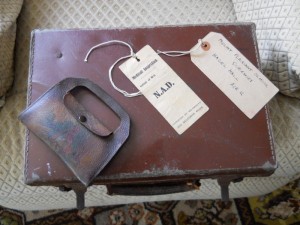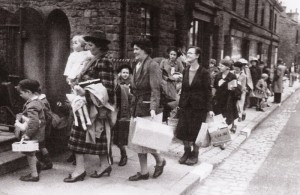In June 1940, 17,000 people were evacuated from Guernsey, to Weymouth, just days before their island was occupied by Germany – see http://porttowns.port.ac.uk/1940-evacuation-st-peter-port-guernsey-england/
The evacuation ships reached Weymouth where the evacuees sat for hours, waiting for permission to disembark. As Winifred Le Page stepped onto dry land, she was approached by French interpreters, “They didn’t think we could speak English.  One person said ‘We thought you’d all be in grass skirts’, and that upset us all, I can tell you!”[1] The evacuees were led into the Pavilion Theatre where they registered their details, received refreshments and underwent a medical inspection. Gavin Dorey recalled, “Goodness knows what they were trying to detect, but perhaps, as refugees from a distant land we were under automatic suspicion of having exotic diseases like leprosy or beri beri.[2] Hazel Hall still possesses her medical label which stated ‘NAD’ – Nothing abnormal detected.[3]
One person said ‘We thought you’d all be in grass skirts’, and that upset us all, I can tell you!”[1] The evacuees were led into the Pavilion Theatre where they registered their details, received refreshments and underwent a medical inspection. Gavin Dorey recalled, “Goodness knows what they were trying to detect, but perhaps, as refugees from a distant land we were under automatic suspicion of having exotic diseases like leprosy or beri beri.[2] Hazel Hall still possesses her medical label which stated ‘NAD’ – Nothing abnormal detected.[3]
Miss Grace Fry travelled as a helper with Vauvert School, and as her group registered, an air raid began, “The children and I were pushed out of the building onto a bus, then to my horror, the driver locked the door and disappeared. We were there for about an hour, I had given up. Then the driver unlocked the door and said ‘Out!’ I had to feel with my foot under the seats in the dark to check whether I had all the children or not.”[4] Gladys Merrien was searching for her husband who had promised to follow her. Her daughter Beryl recalls, “Someone told Mum that Dad was staying in Guernsey to look after our house and business. Also, many animals in the islands were being shot at that time. So Dad was reluctant to leave his horse, Laddie, as he would have to shoot it.”[5] Guernsey men of military age were dealt with separately. Between eight and ten thousand islanders joined the British Forces, athough it was not compulsory for them to do so.[6]
 Because the South coast was experiencing air raids the evacuees were quickly moved away from Weymouth, by train, to Lancashire, Cheshire and Yorkshire where accommodation could be provided. Miss Grace Fry recalled, “Soldiers began to push the children onto a train which started to move. One soldier grabbed my hand and said ‘Can you run?’ A steward appeared in at the open train door, the soldier pushed me into his arms, then off we went. We had no idea where we were going.”[7] On 28 June, news that Germany had bombed Guernsey’s habour reached England and no more ships were sent to collect evacuees. On 30 June, Guernsey was occupied by Germany and thousands of people’s lives were changed forever.
Because the South coast was experiencing air raids the evacuees were quickly moved away from Weymouth, by train, to Lancashire, Cheshire and Yorkshire where accommodation could be provided. Miss Grace Fry recalled, “Soldiers began to push the children onto a train which started to move. One soldier grabbed my hand and said ‘Can you run?’ A steward appeared in at the open train door, the soldier pushed me into his arms, then off we went. We had no idea where we were going.”[7] On 28 June, news that Germany had bombed Guernsey’s habour reached England and no more ships were sent to collect evacuees. On 30 June, Guernsey was occupied by Germany and thousands of people’s lives were changed forever.
20 June 2015 marks the 75th anniversary of the Guernsey Evacuation
https://guernseyevacuees.wordpress.com/evacuation/
Notes
[1] Second World War Experience Centre, Interview with Winifred Le Page (nee West), 2006.
[2] Testimony of Gavin Dorey, The Evacuation, Dorey family papers, 4.
[3] Interview with Hazel Hall, January 2010, 5.
[4] Guernsey Retired Teachers Association, Interview with Miss Grace Fry.
[5] Interview with Beryl Linehan (nee Merrien), May 2010, 2.
[6] Richard Allisette, Islanders in Kitbags, (Guernsey Press: Guernsey, 1985), foreward.
[7] Guernsey Retired Teachers Association, Interview with Miss Grace Fry.










I may have corresponded with you before on this subject a few years ago, but I was interested in the mention of Grace Fry. My father’s cousin, Constance Rees, also taught at Vauvert School and was involved in the evacuation exactly as you describe. Her daughter Janice (who died in 2009) left a school notebook describing her experiences – Connie(a widow) had three children and insisted they stay with her rather than go with their own school in Vale. They were on the Felixstowe, and after the delays and medical examination in Weymouth, they boarded a train which went via Abergavenny and Preston and eventually to Glasgow. Jan’s account is very vivid (she was aged 11) and I have transcribed it and used it in connection with a book club reading of the Potato Peel Pie book – members said it brought the whole thing very close.
If you are interested in receiving a copy of the text I could send it. (Sorry if I have said this before – it’s a few years ago and my memory is not what it was!)
Elizabeth Bass
hi Elizabeth I would love a copy of Jan’s account. However I just emailed you via the email address that showed up on the website and it bounced straight back. Pls can you send another comment with your email address again. thanks so much. Gill 🙂
Hello Elizabeth
Just fascinated to read that you have a record written by Janice. My Dad went to Vauvert school and was evacuated on the Felixstowe on that day June 20th 1940. He ended up Glasgow you said. Would love to have copy of that record. If there is any chance that you can let me have a copy so I can show my children and keep it in my family tree file. . My Dad was evacuated a 2nd time from Glasgow to the West coast after the Clyde bank bombing. He went back to Guernsey after the war.
Dad passed sadly in 2007, but we tell his story often.
Regards Julie.
Julie, this may be a little late now but my Father, Charles Le Milliere, went through a very similar experience but to my shame I don’t know the details as he wouldn’t talk much about it when alive – or we didn’t ask enough. He was evacuated but we don’t know the precise date or whether it was from Alderney or Guernsey as he lived between the two with Grandparents on Alderney and Mother/Step-Father on Guernsey. We’re fairly sure he also went to Weymouth but we do know he then went to Glasgow and was allocated to someone but didn’t get on and went back to “clearing” or whatever they called it. He then was sent to a little village outside Mallaig on the West Coast called Morar, specifically Bracorina. He stayed there til he did his national Service in the RAF and when de-mobbed went to stay with his Auntie in Exeter where he met my mother and settled, also never going back to live though we’ve been over to the islands many times. it total four Aunties never went back and Crock (Cyril) Le Milliere who although a cousin to Dad was more like a brother as they were brought up together also stayed in Exeter with his Mother, Dad’s Auntie Ethel.
Hi Gillian
My late mother, Margaret Earl (neé Hudson) was evacuated by boat along with her younger sister Joan. I think I remember her saying that when they arrived in Weymouth, they slept overnight in St John’s church before they were boarded on the train north. When they got on the train, it was very crowded. One of the girls was asthmatic, so she was hoisted up on to the net luggage rack above the train seats to make the journey. The teachers (nuns) were travelling north with them. My mother and her sister were split up when they arrived in Lancs, billeted with different families. My aunt’s experience was a happier one than my mother’s. The first thing that happened to my Mum was that her billeting family decided to call her Peggy, as their own daughter was called Margaret.
Mum’s parents remained in Guernsey during the occupation. They were tomato growers.
Hello
My father Ernest, brother and sister were evacuated to Scotland from Guernsey but sadly their experience was not a happy one. They were then Fostered to a family in Cornwall where they had a very happy year.
Sadly I do not know their story but was it common to be moved from Scotland?
A family story was that nan wrote to the Queen (Queen Mother) and she arranged for the children to be brought home. She said in a black cab.
Anyone have a similar story to tell, love to hear them.
Or anyone know how I can find information about or trace where children were sent.
Many thanks Wendy
I’m on the same sort of search Wendy, see my reply above. I was recently on Guernsey and they confirmed that many of the records have now been changed form a 50 year to a 100 year release date. They also tell me at every turn that there are no lists or records of the names of evacuees or where they went to but I keep hoping.
My mum went to Bolton initially but was then transferred to Merriott in Somerset until she was school leaving age. After that she went to relatives in London of all places
My brother Rex carre was evacuated with the school heading to Scotland & mum didn’t know where he was for 6 months ,when she found him & brought him down to St Helens where we were billeted with a family with 10 other children so he went live in the next street with a couple who treated him like a slave ,when mum found out the lady we were billeted insisted he come back with them .always room for one more .that lady & mum stayed friends after the war visiting guernsey
I was always under the impression that Grace Fry was head mistress of the Vale infants school. My parents evacuated to Devon, where I was born.
Interesting to read about the reaction of locals in Weymouth. My father was one of the evacuees and was sent to Baildon, in Yorkshire. My mother, still at school herself, once told me that the whole school went to the railway station to meet the evacuees. She recalled that they had never heard of Guernsey, or the Channel Islands, and that when the train arrived they saw all of these very dark skinned (sun tanned!) children, who were speaking a foreign language, and my mother and her friends also wondered if these people had actually come from some exotic South Seas island.